Aquatic Toxicology
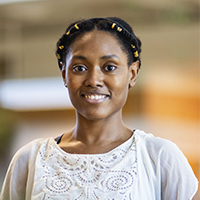 Kristina Fite, a biological sciences master’s student, is investigating the potentially
harmful effects of the chemical 6PPD that’s often used as a stabilizing additive in
rubbers, as well as the byproduct of that chemical when it reacts with the ozone,
6PPD(Q). As a recipient of the U.S. National Science Foundation’s Graduate Research
Fellowship, Fite is conducting a full-scale project to understand more about the chemicals
and their environmental impact — especially on developing amphibian larvae. Ultimately,
Fite wants to work with an endangered animal population and support repopulation of
a species. “I feel like by understanding how we think and interact with the environment,
I can help create conservation or sustainability,” Fite says.
Kristina Fite, a biological sciences master’s student, is investigating the potentially
harmful effects of the chemical 6PPD that’s often used as a stabilizing additive in
rubbers, as well as the byproduct of that chemical when it reacts with the ozone,
6PPD(Q). As a recipient of the U.S. National Science Foundation’s Graduate Research
Fellowship, Fite is conducting a full-scale project to understand more about the chemicals
and their environmental impact — especially on developing amphibian larvae. Ultimately,
Fite wants to work with an endangered animal population and support repopulation of
a species. “I feel like by understanding how we think and interact with the environment,
I can help create conservation or sustainability,” Fite says.
-Heather Noel
Hearing Aid Acceptance
 Adelin Eason, an audiology doctoral student, was inspired to pursue a career as an
audiologist after seeing her brother’s experiences with auditory process disorder
growing up. “There is so much cutting-edge research in the field combined with the
opportunity to really make a difference in people’s lives — that’s what drew me to
this profession,” Eason says. As a UNT research assistant, she already has learned
many research techniques and developed valuable clinical skills through her work collecting
data from participants in a study led by audiology and speech-language pathology faculty
Sharon Miller, Erin Schafer and Boji Lam. Their research will contribute to the understanding
of what drives better hearing aid acceptance.
Adelin Eason, an audiology doctoral student, was inspired to pursue a career as an
audiologist after seeing her brother’s experiences with auditory process disorder
growing up. “There is so much cutting-edge research in the field combined with the
opportunity to really make a difference in people’s lives — that’s what drew me to
this profession,” Eason says. As a UNT research assistant, she already has learned
many research techniques and developed valuable clinical skills through her work collecting
data from participants in a study led by audiology and speech-language pathology faculty
Sharon Miller, Erin Schafer and Boji Lam. Their research will contribute to the understanding
of what drives better hearing aid acceptance.
-Heather Noel
Coatings for Lunar Tech
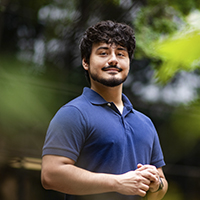 Javier Solis (’24), a master’s student in mechanical and energy engineering, interned
at Johnson Space Center in Houston in Summer 2024. While there, Solis contributed
to a collaborative project UNT College of Engineering and College of Science faculty
are working on with NASA scientists to advance heat transfer coatings for autonomous
space vehicles. At UNT, Solis works on thermal fluids research in the lab of assistant
professor Richard Zhang, principal investigator for the heat transfer coatings project.
In the future, he hopes to work for NASA. “I want to find a novel method of propulsion
to enhance how we explore space and reach farther beyond our solar system,” Solis
says. “My research at UNT is a step in the right direction.”
Javier Solis (’24), a master’s student in mechanical and energy engineering, interned
at Johnson Space Center in Houston in Summer 2024. While there, Solis contributed
to a collaborative project UNT College of Engineering and College of Science faculty
are working on with NASA scientists to advance heat transfer coatings for autonomous
space vehicles. At UNT, Solis works on thermal fluids research in the lab of assistant
professor Richard Zhang, principal investigator for the heat transfer coatings project.
In the future, he hopes to work for NASA. “I want to find a novel method of propulsion
to enhance how we explore space and reach farther beyond our solar system,” Solis
says. “My research at UNT is a step in the right direction.”
-Heather Noel
Native Pollinators
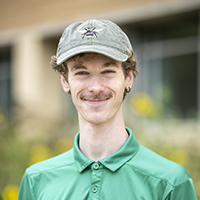 Ethan Phillips, a senior ecology major, researches native bees and other pollinators
in the lab of Elinor Lichtenberg, assistant professor of insect behavior and community
ecology. His interest in bees started while working at the Pollinative Prairie at
UNT’s Discovery Park, where he learned how bee boxes help nurture bee populations.
Phillips later helped lead efforts to add bee boxes across campus with support from
a grant through UNT’s We Mean Green Fund. As an Undergraduate Research Fellow at UNT,
he is studying how bees use the boxes installed on campus. “I hope my research will
not only bring awareness to native bees, but also contribute to conservation methods
that are accessible and effective in supporting populations,” Phillips says.
Ethan Phillips, a senior ecology major, researches native bees and other pollinators
in the lab of Elinor Lichtenberg, assistant professor of insect behavior and community
ecology. His interest in bees started while working at the Pollinative Prairie at
UNT’s Discovery Park, where he learned how bee boxes help nurture bee populations.
Phillips later helped lead efforts to add bee boxes across campus with support from
a grant through UNT’s We Mean Green Fund. As an Undergraduate Research Fellow at UNT,
he is studying how bees use the boxes installed on campus. “I hope my research will
not only bring awareness to native bees, but also contribute to conservation methods
that are accessible and effective in supporting populations,” Phillips says.
-Heather Noel
Exploring AI in Retail
 Cassandra Castro, an undergraduate student double majoring in fashion merchandising
and digital retailing, is researching artificial intelligence in the retail industry.
“AI is very general and not very specific,” says Castro, who is a UNT Undergraduate
Research Fellow. She says Generation Z cares more about individuality than trends,
and she wants to understand Gen Zers’ attitudes toward AI’s generalization of beauty
standards. Her research methods include questionnaires and surveys that also address
the effect social media has on beauty standards. She hopes her study will shed light
on the practices of some retailers and brands regarding AI and body standards. Next
up, Castro might dig further into AI or veer more toward market research for brands.
Cassandra Castro, an undergraduate student double majoring in fashion merchandising
and digital retailing, is researching artificial intelligence in the retail industry.
“AI is very general and not very specific,” says Castro, who is a UNT Undergraduate
Research Fellow. She says Generation Z cares more about individuality than trends,
and she wants to understand Gen Zers’ attitudes toward AI’s generalization of beauty
standards. Her research methods include questionnaires and surveys that also address
the effect social media has on beauty standards. She hopes her study will shed light
on the practices of some retailers and brands regarding AI and body standards. Next
up, Castro might dig further into AI or veer more toward market research for brands.
-Addie Davis
Improving Public Safety
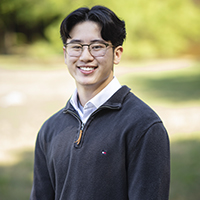 Andrew Summitt, a data science senior, focuses on ways virtual and augmented realities
could be used for emergency evacuation and response. Summitt’s research aims to improve
public safety and develop emergency response systems by combining data visualization
with user-friendly interfaces. “Data tells stories by allowing us to record and measure
information, offering insights beyond numbers,” Summitt says. Working with data science
professor Sharad Sharma, Summitt also is contributing to a geospatial mobile app funded
by a U.S. National Science Foundation grant. Bridging data science with real-world
applications, the app will integrate Google Photorealistic 3D Tiles with Cesium for
Unity and create an AR platform for real-time navigation.
Andrew Summitt, a data science senior, focuses on ways virtual and augmented realities
could be used for emergency evacuation and response. Summitt’s research aims to improve
public safety and develop emergency response systems by combining data visualization
with user-friendly interfaces. “Data tells stories by allowing us to record and measure
information, offering insights beyond numbers,” Summitt says. Working with data science
professor Sharad Sharma, Summitt also is contributing to a geospatial mobile app funded
by a U.S. National Science Foundation grant. Bridging data science with real-world
applications, the app will integrate Google Photorealistic 3D Tiles with Cesium for
Unity and create an AR platform for real-time navigation.
-Audrey Short
Additive Manufacturing
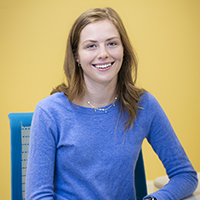 Sydney Fields, a materials science and engineering doctoral student, hopes her research
will contribute to future aircraft developed with additive-manufactured or 3D-printed
titanium alloys. Her advisor, Yufeng Zheng, first introduced her to 3D-printed alloys.
By working in his lab, Fields was able to attend conferences, such as one with The
Minerals, Metals and Materials Society, and collaborate with student researchers at
other universities to gain more insight into the field. As a recipient of the U.S.
National Science Foundation’s Graduate Research Fellowship this past year, Fields
is continuing her research and education at UNT. “With additive manufacturing, we
can decrease product waste, increase fuel efficiency and help the environment,” Fields
says.
Sydney Fields, a materials science and engineering doctoral student, hopes her research
will contribute to future aircraft developed with additive-manufactured or 3D-printed
titanium alloys. Her advisor, Yufeng Zheng, first introduced her to 3D-printed alloys.
By working in his lab, Fields was able to attend conferences, such as one with The
Minerals, Metals and Materials Society, and collaborate with student researchers at
other universities to gain more insight into the field. As a recipient of the U.S.
National Science Foundation’s Graduate Research Fellowship this past year, Fields
is continuing her research and education at UNT. “With additive manufacturing, we
can decrease product waste, increase fuel efficiency and help the environment,” Fields
says.
-Amanda Lyons
Demystifying Health Care
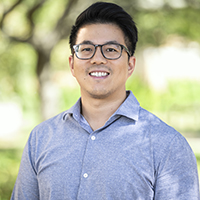 Charlie Su, a doctoral student in clinical psychology, is using his interest in family
processes to change the way health professionals screen clients for various conditions.
He’s exploring how parenting styles and behavioral norms affect individuals with different
cultural backgrounds — and how current screening tools may be assessing things differently
across diverse populations. Su knows improving these tools could be a game-changer
for how the global scientific community helps people with psychological or neuropsychological
conditions, whether through more accurate diagnostic processes or through developing
culturally-competent interventions. “This research could have sweeping effects that
may benefit so many different groups,” he says.
Charlie Su, a doctoral student in clinical psychology, is using his interest in family
processes to change the way health professionals screen clients for various conditions.
He’s exploring how parenting styles and behavioral norms affect individuals with different
cultural backgrounds — and how current screening tools may be assessing things differently
across diverse populations. Su knows improving these tools could be a game-changer
for how the global scientific community helps people with psychological or neuropsychological
conditions, whether through more accurate diagnostic processes or through developing
culturally-competent interventions. “This research could have sweeping effects that
may benefit so many different groups,” he says.
-Bess Whitby
AI and Music
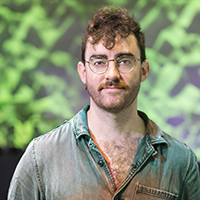 Colin Stokes, a Ph.D. student in composition, is researching artificial intelligence
in computer music systems design. The composer/performer, who was the 2023 Presser
Graduate Scholar, partnered with UNT Regents Professor Marco Buongiorno Nardelli for
a concert at the CURRENTS New Media festival in Santa Fe, New Mexico, in which they
used synthesis models driven by recurrent neural networks. The pair trained the deep
learning system on hours of Stokes’ performances to synthesize compositional material,
which was mixed with live-processed cello and fixed media. Now, they are updating
the model to allow for multi- modality and higher-quality outcomes. “I love the idea
of creating new tools for my fellow composers,” Stokes says.
Colin Stokes, a Ph.D. student in composition, is researching artificial intelligence
in computer music systems design. The composer/performer, who was the 2023 Presser
Graduate Scholar, partnered with UNT Regents Professor Marco Buongiorno Nardelli for
a concert at the CURRENTS New Media festival in Santa Fe, New Mexico, in which they
used synthesis models driven by recurrent neural networks. The pair trained the deep
learning system on hours of Stokes’ performances to synthesize compositional material,
which was mixed with live-processed cello and fixed media. Now, they are updating
the model to allow for multi- modality and higher-quality outcomes. “I love the idea
of creating new tools for my fellow composers,” Stokes says.
-Lisa Sciortino
Exercise Psychology
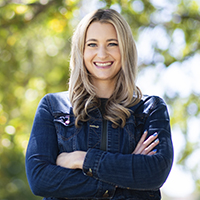 Sabrina Madson, a doctoral student in human performance and movement science, researches
sport and exercise psychology as well as public health. She studied the sport environment
and considered how an athlete’s sense of choice affects their levels of anxiety and
burnout. Her dissertation addresses the effects choice has on pregnant and postpartum
women in exercise. “I’m considering questions like, what are some barriers and motives
that might interfere with the benefits of exercise? And why we aren’t exercising,”
Madson says. She has presented her research nationally, including at the Association
of Applied Sport Psychology annual conference. In the future, Madson is considering
becoming a professor or working in exercise research.
Sabrina Madson, a doctoral student in human performance and movement science, researches
sport and exercise psychology as well as public health. She studied the sport environment
and considered how an athlete’s sense of choice affects their levels of anxiety and
burnout. Her dissertation addresses the effects choice has on pregnant and postpartum
women in exercise. “I’m considering questions like, what are some barriers and motives
that might interfere with the benefits of exercise? And why we aren’t exercising,”
Madson says. She has presented her research nationally, including at the Association
of Applied Sport Psychology annual conference. In the future, Madson is considering
becoming a professor or working in exercise research.
-Addie Davis